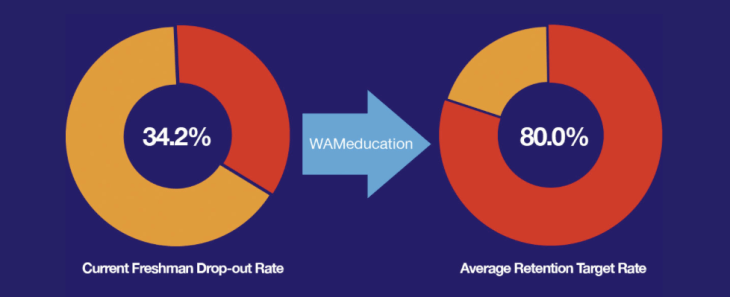Turn on, tune in, drop out. Well, minus the dropping out. That’s — give or take a bit of poetic license — the premise of UK edtech startup Wambiz, which offers colleges and other education providers tools for online communication that are more akin to the apps students already use. The aim being to increase engagement and, ultimately, reduce student churn.
Why is this such a big problem for education providers? Because, in places like the UK, funding invariably follows the student. If a student ends up dropping out, the money drops off a cliff, too.
“Student engagement is a real issue today – colleges will have an intake each year and there will be a sizeable drop out rate across each college,” explains Andrew West, co-founder of Wambiz. “That means that students don’t take the next step in learning and that funding is lost to the college, impacting cash flow, planning and capacity. Educational institutions tell us this totals over £100m across the UK. Let alone the cost to the student.”
To solve this problem, Wambiz has developed what it calls a VEN — or Virtual Engagement Network — an online tool that education providers can use to handle their day-to-day student communication, over more traditional means, such as email and text messaging. By using a more modern approach to online communication, which takes its inspiration from popular “social media” consumer apps, such as WhatsApp or Twitter, the startup is banking on students to stay engaged and stick around for the long haul.
“In the education sector, those in charge and those being taught use different communication channels outside of the classroom to deliver and share content; teachers rely on text/email, but students use tools like Snapchat/WhatsApp. So the two don’t meet,” says West.
But, of course, consumer apps used for college communication aren’t fit-for-purpose, either. Namely, because they are insecure and can’t be controlled by the education provider.
“Traditional social networks are not the answer. They blur the lines between social and school life creating real integrity issues — no parent wants to see their child ‘like’ a bikini shot of a teacher on holiday — with no audit trail or safeguarding.”
Instead, says West, Wambiz offers a controlled, secure environment that has the “same look and feel as traditional social media which still engages the students but also protects teacher’s professional integrity.”
In May, the startup’s product was successfully piloted with South Staffordshire College in the UK, who, after seeing a 90% uptake, plan to roll out the service to all 25,000 students this September. Meanwhile, an additional six further education colleges have signed up.
That means it’s still relatively early days, but investors seem to like what they see. Wambiz has disclosed £600,000 in new funding from the Allan Murdoch Group, a group of UK angel investors, bringing total funding to £1 million.
On Wambiz’s revenue model for its Wamedu offering, West had this to say: “Our app is free for students, teachers and institutions and always will be. Our revenue is generated via college and student engagement.”
Engagement, in the revenue sense, presumably means special offers, discounts and other types of engagement marketing.
